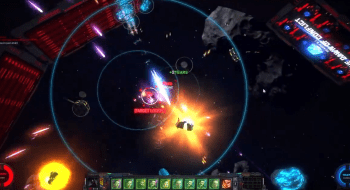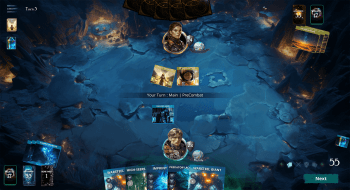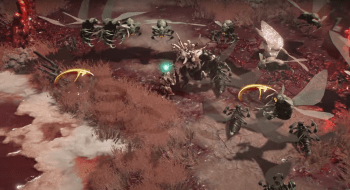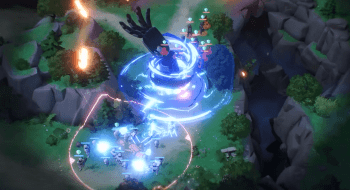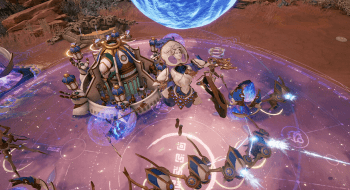[intro] SkateNation XL is an upcoming free-to-play skateboarding arcade game for PC (Windows) and console (PS5) by MBS Studios. The game promises to deliver an immersive and realistic skateboarding experience where players can explore expansive skateparks, urban settings, and real-world skateboarding landmarks...
[intro] Machiavellic is an upcoming space MMO shooter for PC (Windows, Mac). Set aboard a colossal spaceship en route to the resource-rich planet of Ozzar, players assume the role of Overlords, advanced AI entities commanding officers and vying for dominance through strategic combat, resource management, and...
MNRY
$MNRY is a utility and governance token integral to the Moonray gaming ecosystem, which includes...
BSC
BNB Smart Chain (BSC) is a layer-1 blockchain launched by Binance in September 2020 as a parallel blockchain to Binance Chain. While Binance Chain prioritized fast and straightforward transactions, it lacked advanced programmability for smart contracts. BSC was created to address this gap, enabling decentralized applications (dApps) and offering compatibility with Ethereum’s ecosystem via the Ethereum Virtual Machine (EVM).
BSC is widely adopted in Web3 gaming due to its efficiency, low transaction fees, fast processing and wide ecosystem support.
How BSC Works
BSC operates as a blockchain that supports smart contracts and dApps. It uses a consensus mechanism called Proof of Staked Authority (PoSA), a hybrid of Proof of Stake (PoS) and Delegated Proof of Stake (DPoS). Here’s a simplified breakdown:
- Validators stake BNB to become eligible for validating transactions.
- A limited number of validators (usually 21) produce blocks, ensuring high throughput and low latency.
- Validators earn transaction fees as rewards for maintaining the network.
BSC achieves compatibility with Ethereum through its support for the Ethereum Virtual Machine (EVM), enabling developers to port their Ethereum-based projects to BSC with minimal modifications.
Uses in Web3-Supported Games
BSC is widely adopted in Web3 gaming due to its efficiency and ecosystem support. Its low transaction fees and fast processing make it ideal for games requiring frequent interactions, such as asset trades and in-game rewards. Use cases include:
- Tokenized Game Economies: BSC enables the creation of in-game currencies using BEP-20 tokens. Players can earn, trade, and use these tokens across games.
- NFT Integration: Using BEP-721 or BEP-1155, developers can tokenize characters, weapons, and skins as NFTs, ensuring true player ownership and cross-game interoperability.
- DeFi Features: Games on BSC often integrate DeFi mechanics, such as staking game tokens for rewards or participating in liquidity pools.
- Interoperability: BSC’s compatibility with Ethereum tools and wallets (e.g., MetaMask) simplifies onboarding for players and developers alike.
Token Standards on BSC
BSC supports various token standards, each designed for specific purposes:
- BEP-20: Analogous to Ethereum’s ERC-20, this is the most widely used standard for fungible tokens on BSC. It facilitates token creation for DeFi, Web3 games, and governance.
- BEP-721: A token standard for non-fungible tokens (NFTs), ideal for digital collectibles and gaming assets.
- BEP-1155: A multi-token standard allowing the creation of both fungible and non-fungible tokens in a single smart contract, making it suitable for games with diverse asset types.
Popular Web3 Games on BSC
- CryptoBlades: An RPG game where players earn BNB and in-game NFTs.
- My DeFi Pet: A virtual pet game combining DeFi elements with collectibles.
- MOBOX: A platform blending DeFi and NFT-based gaming experiences.
[intro] Ordinem is a free-to-play is a strategic trading card game (CCG) for PC (Windows) by Playa3ull Games, inspired by well-known titles such as Magic: The Gathering and Hearthstone. Players engage in battles using cards from five distinct magical 'orders,' casting spells, summoning creatures, and crafting...
[intro] Seraph is a free-to-play action role-playing game (ARPG) for PC (Windows) and mobile (Android) by Seraph Studio. Inspired by ARPG classics, the game immerses players in an expansive world where they engage in strategic combat, embark on epic quests, collect valuable loot, and craft customized equipment....
WOD
$WOD is the native token of World of Dypians, an action-adventure MMORPG and metaverse for PC...
[intro] Pixel Heroes Adventure is a free-to-play MMORPG for mobile (Android, iOS). Blending farming mechanics and strategic hack-and-slash combat, the game features vibrant pixel graphics, and a rich progression system where players combine skills, collect heroes, pets, and equipment, and engage in PVP and PVE...
[intro] The Watch is a free-to-play multiplayer real-time strategy (RTS) game for PC (Windows) by The Pyramid Watch. In a blend of action real-time strategy and MOBA, two opposing armies of futuristic heroes battle to destroy each other’s bases. Players must build and manage their Battle Decks, deploy units,...
[intro] The Gates of Pyre is a free-to-play real-time strategy (RTS) game for PC (Windows) that combines accessible gameplay with strategic depth. Players assume the role of Immortals, powerful commanders who lead diverse factions and unleash unique abilities to dominate battlefields. Featuring both casual and...
GENE
$GENE one of two cryptocurrencies used in Genopets, a "move-to-play" virtual pet care game with...
CHR
$CHR is the primary in-game currency used in Space Nation Online, a space MMORPG...


